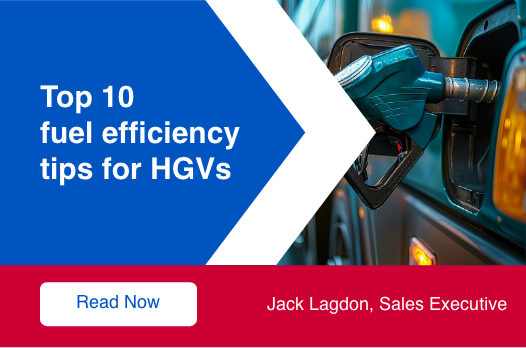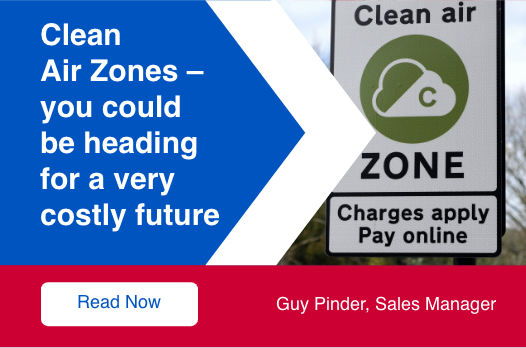Top 10 fuel efficiency tips for HGVs
Fuel efficiency is a critical factor for truck operators. Not only does it directly impact your operating costs, but it also plays a significant role in reducing your business’s environmental footprint. Here are our top 10 fuel efficiency tips for HGVs.
1. Regular maintenance
Keeping your truck in tip-top condition is crucial for ensuring peak operational efficiency.
Here at Dawsondirect, every vehicle we sell is serviced and maintained to the highest standards.
A well-maintained vehicle runs more efficiently, uses less fuel, and is less likely to break down.
You should make sure you regularly:
- Undertake oil changes.
- Check and replace air filters.
- Inspect and maintain the fuel system.
- Service the engine.
2. Optimising route planning
Efficient route planning can significantly reduce fuel consumption, so use GPS and route optimisation software with real-time traffic data to find the best route.
Consider:
- Planning for off-peak travel times.
- Avoiding routes with frequent stops, high congestion, steep inclines, and meandering rural roads.
- Planning your refuelling stops.
3. Driver training
Techniques, such as smooth acceleration, maintaining a steady speed, and anticipating traffic flow, can reduce fuel consumption.
It might be worthwhile investing in additional refresher training for your drivers on fuel-efficient driving techniques such as:
- Avoiding harsh braking and acceleration.
- Using cruise control where appropriate.
- Minimising idling time.
- Stop avoidance – having stopped, a truck uses significantly more fuel to get it moving again.
- Changing gears efficiently and driving in the highest possible gear for the speed.
- Limiting the use of air-conditioning as the conversion of warm outside air to cool air inside consumes fuel.
To help you operate your vehicles as fuel-efficient as possible, we offer our Driver Training + programme free of charge for any vehicle acquired from us.
4. Aerodynamic enhancements
Improving the aerodynamics of an HGV can reduce drag and improve fuel efficiency.
A vehicle can be streamlined, and its fuel consumption reduced, by adding features such as:
- Roof-mounted deflectors.
- Side skirts to cover the gap between wheels.
- Rear tail fairings
5. Load management
Poor load management can increase fuel consumption and cause additional wear and tear on the vehicle.
Make sure you:
- Distribute your load evenly.
- Avoid overloading.
- Secure the load properly to prevent shifting.
- Use smaller trucks for smaller loads.
6. Utilising telematics
Telematics systems provide real-time data on vehicle performance, driver behaviour, and fuel usage.
By analysing this data, you can identify areas for improvement and go about enhancing your fuel efficiency.
The benefits of telematics also include monitoring driver performance and tracking fuel consumption patterns.
7. Tyre management
Tyres play a crucial role in fuel efficiency.
Make sure you:
- Use the right type of tyre for your particular vehicle.
- Regularly check your tyres for any faults.
- Maintain your tyres at the correct pressure – under-inflated tyres increase rolling resistance, leading to higher fuel consumption.
- Rotate tyres as recommended by the manufacturer.
- Consider using fuel-efficient or low-rolling resistance tyres.
- Check that your tyre and wheel alignment are correct.
8. Speed management
Maintaining an optimal, constant speed can enhance fuel efficiency.
High speeds lead to increased air resistance and push up your fuel consumption.
Familiarise your drivers on the benefits of driving within the optimal speed range, and how to:
- Use cruise control to maintain a steady speed, especially on motorways and flat roads.
- Avoid speeding.
- Follow the manufacturer’s recommended speeds.
- Avoid slowing down and speeding up as your vehicle will use more fuel than necessary.
9. Fuel quality
Ensure that the fuel you use meets the necessary standards and is free from contaminants:
- Purchase fuel from reputable suppliers.
- Regularly check fuel filters.
- Use high-quality fuel and avoid lower-grade versions.
10. Reduce idling
Idling consumes fuel without moving the vehicle, so reducing idling can cut unnecessary fuel wastage:
- Turn off the engine during long stops.
- Use auxiliary power units (APUs) for heating and cooling.
- Educate drivers about the cost of idling.
Conclusion
By following our top 10 fuel efficiency tips for HGVs, you can reduce your fuel consumption, lower your operating costs, improve your bottom line, reduce carbon emissions, and combat climate change.
Jack Lagdon, Sales Executive, Dawsondirect
Recent News
- How to Finance a Used Truck or Trailer in the UK: Options Explained
- Euro VI and Clean Air Zones: What to Consider When Buying a Used Truck in the UK
- Used HGV Buying Mistakes That Cost UK Operators Thousands (And How to Avoid Them)
- Is a Used Truck a Better Investment Than New? A UK Fleet Cost Comparison
- Is Now a Good Time to Buy a Used Truck in the UK? Market Trends and Buyer Advice
- Curtainsider vs Box vs Refrigerated: How to Choose the Right Used Trailer for Your Operation
- Used Truck Inspection Checklist: How UK Fleet Buyers Can Avoid Costly Mistakes
- What Mileage Is Too High for a Used HGV? A UK Buyer’s Guide
- How to Buy a Reliable Used Trailer in the UK: Expert Advice for Fleet Buyers
- The True Cost of Buying a Used Truck: What UK Buyers Often Overlook
- Top Things to Check When Buying Used Trailers: A Checklist for Logistics Operators
- 5 Common Mistakes Haulage Companies Make When Upgrading Their Fleet — and How to Avoid Them
- How to Spot a Reliable Used Trailer or Truck: Expert Tips from the Yard
- Navigating the Used Commercial Vehicle Market: A Strategic Guide for UK Operators
- Why the Demand for Used Trucks Is Rising in 2025
- Get to Know… Luke Thorsen
- Trends in the UK used truck market
- Get to Know… Guy Pinder
- Get to Know… Emma Denton
- Get to Know… Gareth Williams
- Choosing the right used truck for your business needs
- How important are truck drivers and good quality trucks to the UK economy?
- Driving and caring for an HGV in winter
- Top 10 fuel efficiency tips for HGVs
- Clean Air Zones – you could be heading for a very costly future
- UK Operator Licences – an essential guide
- Excellent customer service comes as standard with Dawsondirect
- Get to Know… Stuart Gray, our new General Manager
- Turbocharge your career in used truck and trailer sales!
- What to look for when buying a used truck
- Dawsondirect – your first choice for quality used trucks and trailers
- ‘Interesting’ time in the used truck and trailer market
- Used truck and trailer live auctions are back!
- Warehouse on Wheels satisfies strong demand at Summer events
- Get to Know… James Hunter, Head of Remarketing
- Perfect storm poses new challenges for stallwart in used truck sales
- Multi-million-pound investments in fleet renewal and refresh
- New Dawsongroup South West supersite opens for business
- Don’t get caught out by London’s Direct Vision Standard!




